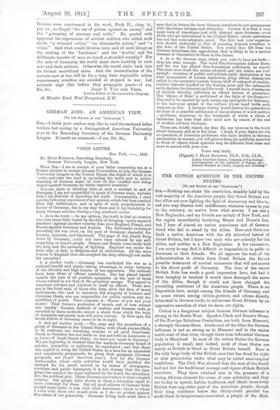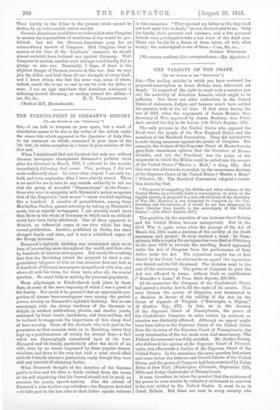THE COTTON QUESTION IN THE UNITED STATES.
[To TE2 EDIT011 OF TII• ..SPZCZATOZ:1 SIR,—Nothing can shake the conviction, steadily held by the vast majority of the American people, that Great Britain and her allies are now fighting the fight of democracy and liberty, and you may dismiss with indifference whatever comes to you to the contrary, no matter from what source. I am not A New Englander, and my friends are mainly of New York, and the region immediately bordering Mason and Dixon's line, but I hear of almost no native Americans not of German blood who fail to stand by the Allies. Hero and there one finds a native American with the old inherited hatred of Great Britain, but I know two such who are ardently for the Allies, and neither is a New Englander. A few extremists, I am sorry to say, find it difficult or impossible to be polite to Germans or their friends. We all approve the wish of the Administration to obtain from Great Britain the faiteat possible treatment of neutral commerce that will not accrue to the direct profit of Germany. The tone of the recent British Note Lae made a good impression here, but had it been haughty or insolent it would have damaged the cause of the Allies, though it could not have changed the prevailing sentiment of the American people. There is no disposition here, except among the friends of Germany, and to some extent, among cotton-growers, and others directly interested in German trade, to embarrass Great Britain by an aggressive assertion of what we deem our rights.
Cotton is a dangerous subject because German influence is strong in the South-West. Speaker Clark and Senator Stone, of the Foreign Relations Committee, are both from Missouri, a strongly German State. South-east of the Ohio the German influence is not so strong as in Missouri and in the region north-west of that river, though there is an influential German body in Maryland. In most of the cotton States the German population is small, and, indeed, most of these States are nearly as British in blood as Great Britain herself. Here is the only large body of the British race that has lived for eight or nine generations under what may be called semi-tropical conditions. The Civil War showed that the men of the South had not lost the traditional courage and vigour of their British ancestors. They have retained also in the presence of a strong African clement the sense of race solidarity, and they are to-day in speech, habits, traditions, and ideals more truly British than any other part of the American people, though their long residence below the thirty-ninth parallel has made them in temperament somewhat a people of the Midi.
Their loyalty to the Allies in the present crisis cannot be shaken by an unfavourable cotton market.
German-Americans would have us believe that were Congress in session the exportations of munitions of war would be pro- hibited. Let not the German-Americans pray for an extraordinary session of Congress. Had Congress been in session at the time of the 'Lusitania' massacre, we should almost certainly have declared war against Germany. With Congress in session, another such outrage could hardly fail to plunge us into war. Personally, I hope, if there is the slightest danger of German success in this war, that we may join the Allies, and lend them all our strength of every kind ; and I know others who feel the same way, some of whom, indeed, would like to see us cast in our lot with the Allies at once. I see no sign anywhere that American sentiment is softening toward Germany, or cooling toward the Allies.—I am, Sir, &c., E. N. VALLANDIGHAM. Chestnut Hill, Massachusetts.



































 Previous page
Previous page